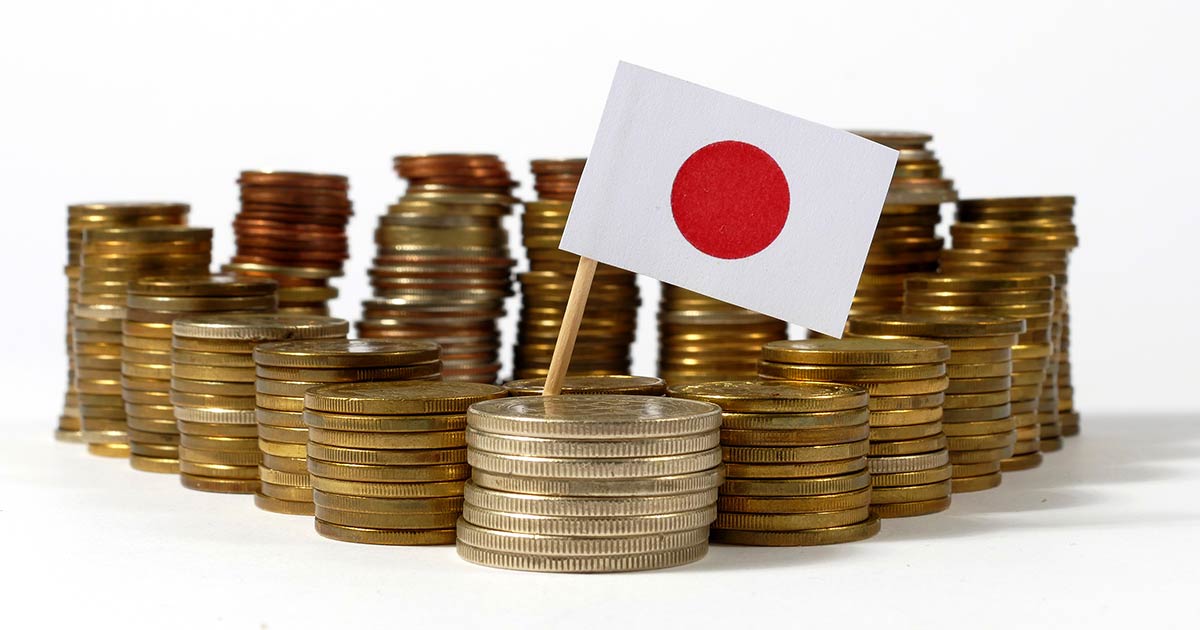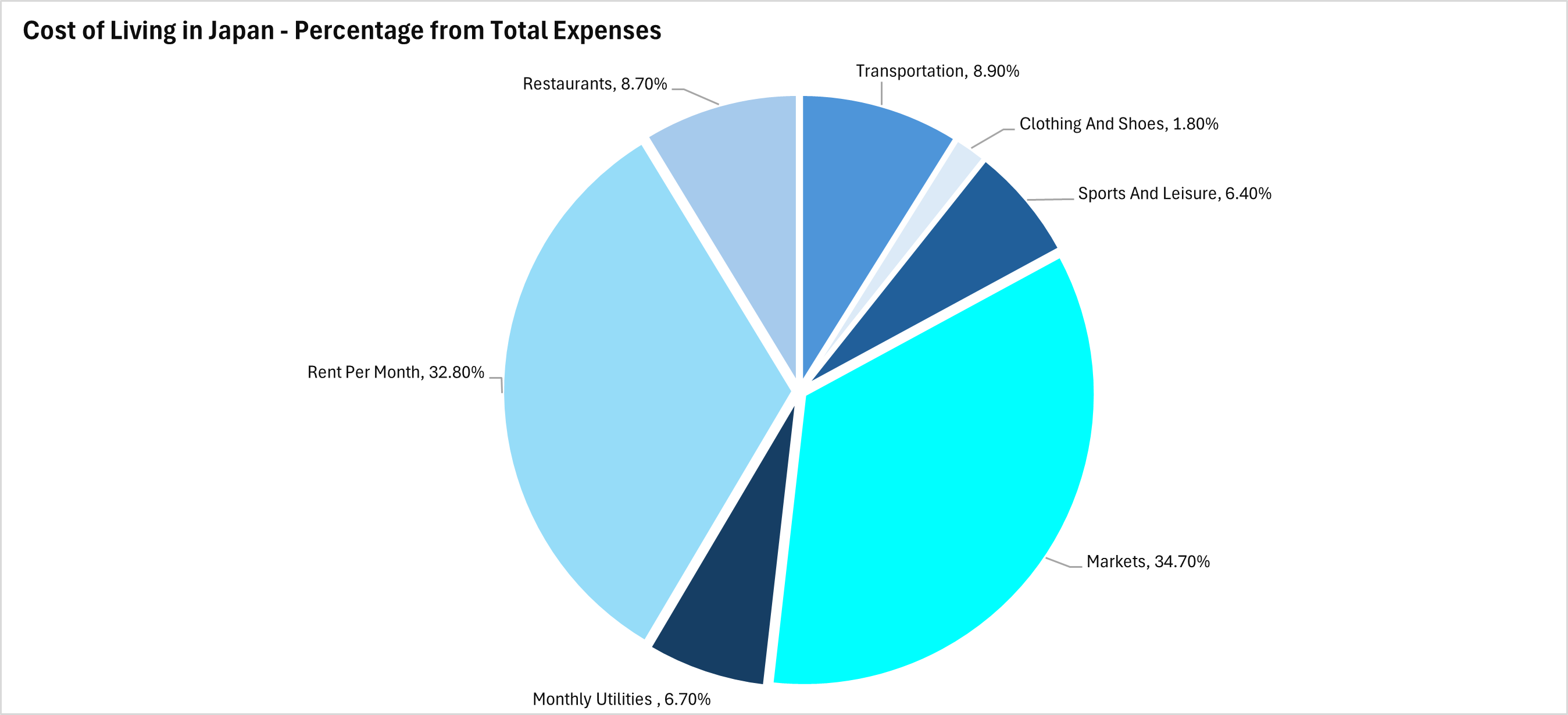Cost of living in Japan – single, family & student

This article covers:
- Overview of cost of living in Japan
- Do you know?
- A glance at the average cost of living in Japan
- The average cost of living in Japan: Single vs student vs family
- Average cost of living in Japan citywise
- Tax scenario
- What salary do you need to live in Japan?
- What should be your monthly budget to live in Japan?
- Do’s and Don’ts
- Top Cities in Japan for Students and Job Seekers
- Before you go…
- FAQs
The cost of living in Japan for a single person is around ¥ 166,000 monthly.
As exciting as it is to experience the rich culture of Japan, considering the financial aspects, such as the average cost of living in Japan is crucial if you are planning to move to the country.
This guide will provide a comprehensive overview of the expenses you can expect as a single professional, a family or a student to ensure that planning your budget to live in Japan goes smoothly and that you can make the most of your time in Japan.
Overview of cost of living in Japan
- The cost of living in Japan for a single person = ¥ 166,000 per month with rent and ¥ 91,000 without rent.
- The average cost of living in Japan for a student = ¥ 93,000 per month with rent and around ¥ 55,000 without rent.
- The cost of living in Japan for a family of four = ¥ 427,000 per month with rent and ¥ 280,000 without rent.
Do you know?
- Japan, with a total GDP of 4,256,411 Million USD, is currently third in the World Bank’s 2022 GDP rankings globally. [1]
- As per the World Health Organisation, Japan has a high life expectancy rate, with a reported average of 84.5 years in 2021. [2]
- Japan secured the 11th position globally with 177.6 points in the Quality of Life Index, making it one of the best countries to live in.[3]
A glance at the average cost of living in Japan

Expense Category | Percentage from Total Expenses |
Transportation | 8.9% |
Clothing And Shoes | 1.8% |
Sports And Leisure | 6.4% |
Markets | 34.7% |
Monthly Utilities | 6.7% |
Rent Per Month | 32.8% |
Restaurants | 8.7% |
Source: Numbeo
The average cost of living in Japan: Single vs student vs family
Type of expense | Avg. cost per month for student | Avg. cost per month for singles | Avg. cost per month for family |
Rent and Utilities (electricity, water, heating, etc. ) | ¥ 45,000 | ¥ 75,100 | ¥ 146,000 |
Food/groceries | ¥ 28,000 | ¥ 56,900 | ¥ 151,000 |
Transportation | ¥ 4,000 | ¥ 19,700 | ¥ 53,900 |
Health Care | ¥ 3,000 | ¥ 40,000 | ¥ 35,812 |
Source: Livingcost.org, Internations.org, Studyinjapan.go.jp, Statista.
An overview of monthly rents in Japan
Expense Category | Item | Avg. cost per month |
Housing | 1-bedroom apartment (in the city centre) | ¥ 87,064.10 |
1-bedroom apartment (outside the city centre) | ¥ 56,853.53 | |
3-bedroom apartment (in the city centre) | ¥ 181,568.65 | |
3-bedroom apartment (outside the city centre) | ¥ 114,586.07 |
Source: Numbeo
Average cost of living in Japan citywise
Type of expense | Tokyo | Yokohama | Osaka | Nagoya |
Avg. Monthly Salary (after taxes) | ¥ 437,000 | ¥ 378,000 | ¥ 318,000 | ¥ 321,000 |
Cost of living (single) | ¥ 236,000 | ¥ 201,000 | ¥ 169,000 | ¥ 181,000 |
Cost of living (family) | ¥ 606,000 | ¥ 513,000 | ¥ 445,000 | ¥ 551,000 |
Rent & utilities (single) | ¥ 115,000 | ¥ 93,500 | ¥ 65,100 | ¥ 82,400 |
Rent & utilities (family) | ¥ 233,000 | ¥ 189,000 | ¥ 136,000 | ¥ 238,000 |
Food (single) | ¥ 64,500 | ¥ 56,200 | ¥ 55,500 | ¥ 52,700 |
Food (family) | ¥ 173,000 | ¥ 151,000 | ¥ 148,000 | ¥ 141,000 |
Transport (single) | ¥ 40,700 | ¥ 35,200 | ¥ 33,500 | ¥ 33,300 |
Transport (family) | ¥ 112,000 | ¥ 94,000 | ¥ 93,300 | ¥ 90,200 |
The overall quality of life | 100 | 97 | 96 | 92 |
Source: Livingcost.org (Refer to citiwise cost of living pages)
Tax scenario
Japan’s income tax system is based on self-assessment and requires taxpayers to calculate their taxable income and file returns by the following year’s deadline.
While taxpayers determine their tax obligations and file returns, employers withhold taxes from salaries, wages, and other specific incomes.
From 2013 to 2037, 2.1% of the ‘Special Income Tax for Reconstruction’ was added to support the recovery efforts for the damage caused during the 2011 Tohoku earthquake and tsunami.
Income tax obligations vary based on the residency status of individuals residing in Japan. Here is a quick overview of the same.
Classification | Income source other than Foreign Source Income | Foreign source Income | ||
Paid in Japan | Paid Abroad | |||
Resident | Resident other than non-permanent resident | Taxable | ||
Non-permanent Resident | Taxable | Only the portion deemed remitted to Japan is Taxable | ||
Classification | Domestic Source Income | Income other than Domestic Source Income | ||
Non-resident | Taxable in principle | Non-taxable | ||
Source: The National Tax Agency of Japan
What salary do you need to live in Japan?
The average salary required to live in Japan varies depending on individual circumstances. Recent data from SalaryExplorer shows that the average salary in Japan in 2024 is approximately ¥ 516,000 per month, about ¥ 6,200,000 annually.
For a single-working professional, around a minimum of ¥ 200,000 per month may be required to cover the basic living expenses. While the basic monthly cost of living in Japan for a couple may go over ¥ 300,000, a family may require around ¥ 500,000 for a comfortable lifestyle.
These estimates can differ significantly depending on location, spending habits, specific needs and overall lifestyle choices.
Although Japan’s standard of living is considerably higher than most countries, it is crucial to consider individualistic aspects as you plan your finances. When in Japan, living expenses can vary based on the city and location you choose, and how you manage your finances.
Also read: Average salary in Japan
What should be your monthly budget to live in Japan?
Category | Student | Single | Family |
Housing/Rent | ¥ 35,000 – ¥ 40,000 | ¥ 73,000 – ¥ 77,000 | ¥ 145,000 – ¥ 149,000 |
Utilities | ¥ 5,000 – ¥ 9,000 | ¥ 8,000 – ¥ 12,000 | ¥ 18,000 – ¥ 26,000 |
Groceries | ¥ 26,000 – ¥ 32,000 | ¥ 56,000 – ¥ 61,000 | ¥ 149,000 – ¥ 153,000 |
Transportation | ¥ 3,000 – ¥ 7,000 | ¥ 17,000 – ¥ 22,000 | ¥ 51,000 – ¥ 56,000 |
Health insurance | ¥ 2,000 – ¥ 6,000 | ¥ 30,000 – ¥ 45,000 | ¥ 120,000 – ¥ 180,000 |
Other (entertainment, shopping, personal care) | ¥ 4,000 – ¥ 7,000 | ¥ 12,000 – ¥ 20,000 | ¥ 25,000 – ¥ 41,000 |
Total##(approximately) | ¥ 75,000 – ¥ 101,000 | ¥ 196,000 – ¥ 237,000 | ¥ 508,000 – ¥ 605,000 |
##It is an approximate value based on the consumer prices and average living expenses of an individual. It is advisable to consider income level, spending habits, location, and specific monthly costs to calculate an accurate budget.
Do’s and Don’ts
Do’s
- Save Money with IC Cards:
Prepaid cards, known as IC cards, are popular in Japan for transit and shopping. Although the savings might be small, IC cards ensure you pay the exact fare for shopping travel instead of a rounded-up cash amount. These can be used at convenience stores, train station shops and vending machines.
- Shop Smart:
Shops at supermarkets are known for closing-time discounts. Prices can drop up to 50% during these sales offering a great way to save on food and grocery expenses.
If this is not an easily available option, shop at wholesale markets like Gyomu Suupaa and Costco. Although you need to pay an additional ¥ 4000 for a Costco membership before your first shopping trip, the store offers a variety of goods at discounted prices.
- Cook at home:
Cooking at home can significantly help you cut your overall food expenses, especially when paired with smarter shopping habits.
By cooking at home you can control your expenses by managing your portion sizes and using your ingredients efficiently. This helps you minimise both food waste and costs.
- Utilise student discounts:
If you are a student living in Japan, there are several ways to save or manage money. Make sure you utilise various student discounts available on transportation expenses, restaurants and cafes.
Retail stores catering to young adults and students also offer significant discounts that can help save money on clothes, electronics and even stationery.
- Get Point Cards:
Using point cards in places you frequent for shopping, at cafes, convenience stores or pharmacies can help accumulate points that can be used to pay for your purchase instead of money when required. These are also available digitally for some restaurants and shops through popular apps like Line.
Don’ts
- Overly rely on convenience stores:
Although convenience stores are a cost-effective option for ready-made meals, they can be expensive for daily essentials and groceries. Moreover, only relying on packaged food for the long term can impact your health significantly.
- Ignore Seasonal Discounts:
Seasonal sales and discounts are common in Japan, especially during major holidays. These sales offer substantial discounts on quality clothing, electronics and other items.
- Neglect Budgeting your Utilities:
Utility costs, including electricity, heating, and water, can vary depending on the city and location of your choice. However, without a budget, you may encounter unexpected expenses.
- Ignoring Public Transportation Options: .
Japan has an extensive and efficient transportation system. From the Japanese railway to buses, all public transportation options offer great connectivity throughout the country.
Instead of opting for expensive taxis, it is advisable to research the connectivity of buses and trains when travelling in Japan and save more on transport costs.
Top Cities in Japan for Students and Job Seekers
- Tokyo
Tokyo is Japan’s capital and its largest metropolitan city. As the country’s financial, political, and cultural hub, it attracts businesses, students, and tourists worldwide.
Tokyo offers many job opportunities across various industries, including finance, it, entertainment and fashion.
Leading universities such as the University of Tokyo and Waseda University are well known for their academic excellence and research.
Living in Tokyo provides many amenities and a unique opportunity to experience its dynamic culture.
Average cost of living per person: ¥ 236,000 per month.
- Yokohama
Yokohama is a city located to the south of Tokyo. It is Japan’s second-largest city and a major port hub that offers a more relaxed lifestyle compared to the fast-paced metropolis of Tokyo.
Yokohama has a thriving business environment with various industries like shipping, logistics, technology, and automotive manufacturing, which offers a variety of job opportunities.
Yokohama City University and Yokohama National University are notable educational institutions that attract students interested in marine science, engineering and international business.
Average cost of living per person: ¥ 201,000 per month
- Osaka
Osaka is a city that is located in the Kansai region of Japan. It is the third largest city in the country and a dynamic economic centre.
This city is home to major corporations in electronics, pharmaceuticals and textiles making it a prime destination for job seekers.
Educational institutions like Osaka University and Kansai University are well respected for their research programs and international partnerships.
Average cost of living per person: ¥ 169,000 per month
- Nagoya
Located in the Chubu region, Nagoya is Japan’s fourth largest city and a key industrial centre.
Known as the heart of the automotive industry in Japan, it is home to major manufacturers like Toyota and Mitsubishi. The city also offers diverse job prospects in aerospace, ceramics and machinery manufacturing for engineers and business professionals.
Nagoya University and Nagoya Institute of Technology are prestigious institutions that draw students interested in robotics, engineering and material sciences.
Average cost of living per person: ¥ 181,000 per month
Before you go…
If you want to live in Japan and explore the opportunities there, start planning now. Assess your finances and consider factors like Japan’s inflation rate and the average cost of living in your desired city or location.
Additionally, research income levels and average salaries in Japan. This information will help you plan your budget to live in Japan more efficiently, considering taxation and expected income. Upon moving if you plan to send money from Japan back home, you will need a reliable and cost-effective source like Instarem to ensure transactions go smoothly.
Instarem offers competitive exchange rates and secure transactions that ensure fast** and safe transfers whenever you want to send money to India from Japan. Moreover, our favourable coverage rates ensure affordable# transactions every time your currency is converted from JPY to INR.
Download the Instarem App from the App Store and Google Play for hassle-free money transfers.
FAQs
Q. Is it expensive to live in Japan?
Japan’s cost of living index rates Japan’s cost of living as 1.05 times more expensive than the global average.
Q. How much money do you need to live in Japan?
The amount of money required to live in Japan comfortably varies depending on many factors. However, the average amount can range between ¥ 196,000 – ¥ 237,000 for one person.
Q. How much does it cost to live in Japan for International students?
It can cost international students somewhere between ¥ 75,000 – ¥ 101,000 to live comfortably in Japan.
Q. Is it cheaper to live in Sydney or Japan?
Japan’s cost of living is considerably cheaper when compared to that of Sydney, Australia. One would need around ¥ 1,055,593 in Sydney to maintain the same standard of life that you can have with ¥ 680,000 in Tokyo.
Q. What is the average room rent in Japan?
The average room rent for a 1 bedroom apartment in the city centre can cost around ¥ 87,064.10.
Q. What is the cost of living in Japan per month?
The average monthly cost of living in Japan for a single person is around ¥166,000 per month.
Q. How much is the cost of living in Japan for a couple?
The basic monthly cost of living in Japan for a couple ranges around ¥ 300,000.
Q. What is the cost of living in Japan for a single person?
The average annual cost of living in Japan for single is around ¥1,992,000.
Q. What is the cost of living in Japan for a family?
The cost of living in Japan for a family is ¥ 427,000 per month with rent and ¥ 146,000 per month without rent.
Q. What is a good salary in Japan?
The average monthly salary in Japan after income tax is around ¥329,000. However, income level, spending habits, location, and specific monthly expenses influence an individual’s disposable income and lifestyle.
Other Related Articles
Disclaimer:
- This article is intended for informational purposes only. All details are accurate at the time of publishing. Instarem has no affiliation or relationship with products or vendors mentioned.
- Prices mentioned in this blog are subject to change.
- ** Fast meaning 75% of our transactions are completed in 15 minutes. Depending on the funding method.
- # When it comes to affordable exchange rates and fees, it’s worth noting that the cost will vary depending on how you choose to fund your transactions. Credit card funding and bank transfer fees can differ significantly.
- The prices were taken on 20th and 21st June 2024 from different sources and are subject to change.
Citations:
[1]https://datacatalog.worldbank.org/search/dataset/0038130
[2]https://data.who.int/countries/392
[3]https://www.numbeo.com/quality-of-life/rankings_by_country.jsp?title=2024
 Get the app
Get the app


























